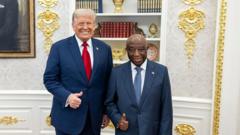On June 21, 2025, President Trump revealed that the U.S. military conducted airstrikes on three key Iranian nuclear locations, marking a significant escalation in the ongoing conflict. Though the strikes were framed as a necessary military action, questions remain about their long-term impact and Iran's potential response.**
U.S. Strikes on Iranian Nuclear Sites Escalate Tensions in Middle East**

U.S. Strikes on Iranian Nuclear Sites Escalate Tensions in Middle East**
President Trump announces military intervention as U.S. bombs Iran's uranium enrichment facilities, heightening conflict and complicating diplomatic efforts.**
In a dramatic escalation of tensions in the Middle East, President Donald Trump confirmed on June 21, 2025, that the U.S. military had executed airstrikes on three critical nuclear sites in Iran. These strikes included the fortified uranium-enrichment facility at Fordow, amplifying concerns over regional stability and the potential for further military confrontations.
The announcement was made via Trump's social media platform, where he described the operation as "very successful" and reassured the public that all military personnel had returned safely to base. "All planes are now outside of Iran airspace," he stated, suggesting a swift and coordinated attack to neutralize perceived nuclear threats.
The decision to strike came after Trump indicated in recent days that he was weighing military options against Iran, which has been embroiled in conflict with Israel as it seeks to develop nuclear capabilities. Unexpectedly, Trump emphasized that despite these military actions, there remains a possibility for diplomatic resolution, although the feasibility of such discussions is questionable given the heightened state of hostility.
Prior to the strikes, the U.S. government had coordinated closely with Israeli officials, who were informed of the decision beforehand. Trump’s communication with Israeli Prime Minister Benjamin Netanyahu post-strike indicates a strategic partnership in their mutual interests concerning Iran.
However, the situation remains fluid, and experts are assessing the extent of damage inflicted on Iran's nuclear capabilities and the likelihood of retaliatory actions. Domestically, Trump faces a mixed response from Republican lawmakers, with some advocating for a decisive military stance and others urging caution regarding escalation.
As both the U.S. and Iran navigate this precarious moment, the potential for diplomatic negotiations hangs in the balance, leaving many to question the long-term ramifications of this military intervention.
The announcement was made via Trump's social media platform, where he described the operation as "very successful" and reassured the public that all military personnel had returned safely to base. "All planes are now outside of Iran airspace," he stated, suggesting a swift and coordinated attack to neutralize perceived nuclear threats.
The decision to strike came after Trump indicated in recent days that he was weighing military options against Iran, which has been embroiled in conflict with Israel as it seeks to develop nuclear capabilities. Unexpectedly, Trump emphasized that despite these military actions, there remains a possibility for diplomatic resolution, although the feasibility of such discussions is questionable given the heightened state of hostility.
Prior to the strikes, the U.S. government had coordinated closely with Israeli officials, who were informed of the decision beforehand. Trump’s communication with Israeli Prime Minister Benjamin Netanyahu post-strike indicates a strategic partnership in their mutual interests concerning Iran.
However, the situation remains fluid, and experts are assessing the extent of damage inflicted on Iran's nuclear capabilities and the likelihood of retaliatory actions. Domestically, Trump faces a mixed response from Republican lawmakers, with some advocating for a decisive military stance and others urging caution regarding escalation.
As both the U.S. and Iran navigate this precarious moment, the potential for diplomatic negotiations hangs in the balance, leaving many to question the long-term ramifications of this military intervention.





















